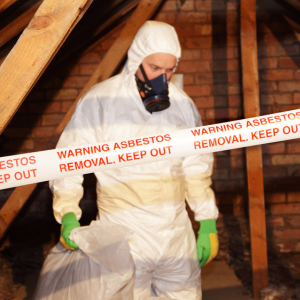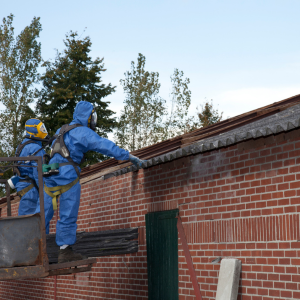
Selling a house with asbestos in Garland, TX, is possible with the proper guidance. Southern Hills Home Buyers can help you disclose asbestos adequately and navigate the process safely and confidently.
The Importance Of Proper Asbestos Identification When Selling A Home In Texas
Selling a home in Texas poses unique problems, especially when dealing with asbestos. Proper asbestos identification is more than just complying with Texas legislation; it also ensures a smooth real estate transaction and protects the interests of both sellers and potential buyers. Knowing where asbestos may be hidden in older Texas homes has a big impact on the property sale process. This tutorial will go over the most important information concerning asbestos that every Texas homeowner should know, focusing on typical areas in older homes. Whether you’re selling a single-family home or handling an estate sale, identifying asbestos is critical to a successful transaction.
What Every Texas Home Seller Needs to Know About Asbestos
For homeowners in Texas aiming to sell, grasping the nuances of asbestos is crucial. Asbestos, previously favored for its strength and ability to withstand heat, presents significant health hazards when its fibers become airborne and are inhaled. Numerous older residences in Texas often have asbestos present in different forms, adding complexity to property transactions. Home sellers must prioritize comprehensive asbestos testing prior to putting their property on the market. This guarantees that any possible risks are recognized and handled effectively, building confidence with prospective buyers and complying with Texas legal standards.
In Texas, the law requires specific disclosures during real estate transactions, such as informing buyers about the presence of asbestos. Consumers are becoming more informed and careful regarding these matters, highlighting the importance of transparency. Proper asbestos identification protects both parties in the transaction and can prevent legal disputes. It’s essential for sellers to be ready to talk about their approach to identifying and managing asbestos. In certain situations, it may be wise or even mandated by local regulations to conduct professional asbestos testing, offering an extra measure of assurance in compliance with real estate laws.
Additionally, recognizing the importance of transparency in real estate dealings can greatly influence the marketability of a property. By pinpointing and revealing asbestos sites early on, sellers may be able to secure more favorable terms during the sale, facilitating a seamless transaction. Being upfront and honest with potential buyers fosters trust, which can streamline the sales process. Consequently, following Texas’s strict asbestos identification and disclosure regulations is a crucial aspect of effectively preparing a home for sale.
Common Locations of Asbestos in Older Houses
Asbestos is more likely to be found in older properties, especially those built before the 1980s. Texas homeowners need to be aware of where this dangerous substance can be found as they get their homes ready to sell. Asbestos is most typically found in attic insulation, especially in homes with vermiculite insulation, which often has asbestos fibers in it. Another common place to find asbestos is in floor tiles, especially the 9×9-inch ones that were popular in homes built in the middle of the century. Finding these things is very important for a successful real estate deal in Texas.
Asbestos is also common in roofing materials like shingles, felt, and siding. Sellers need to check these places and maybe hire professionals to find asbestos. Old HVAC duct insulation and the area around boilers, fireplaces, and pipes used for heating a home may also contain asbestos. Because certain materials could be dangerous to your health if they are disturbed, it is very important to identify and mark them correctly before selling them.
Doing an asbestos test, which may include these important places, not only gets the house ready for sale but also gives buyers peace of mind about the safety of the property. Real estate deals in Texas need to be open and honest; therefore, knowing these exact places helps with honest disclosures. Buyers can trust the property’s history and safety by making sure these areas are tested for asbestos and letting them know what the results are, whether they need to be fixed or removed. This makes real estate transactions go more smoothly.
Legal Aspects: Do You Have To Disclose Asbestos When Selling A House In Texas?

When selling a home in Texas, asbestos disclosure is an important legal consideration. Sellers must manage complex legal issues to ensure compliance and avoid potential liabilities. Understanding the complexities of Texas asbestos disclosure law facilitates real estate transactions while protecting both buyers and sellers. This section discusses the legal requirements for asbestos disclosure in Texas, emphasizing the importance of following state legislation. We delve into Texas asbestos disclosure regulations, as well as the need for inspections and certifications, to ensure that every homeowner is legally prepared to sell their house.
Understanding Texas Law on Asbestos Disclosure
In Texas, real estate transactions are subject to severe asbestos disclosure rules. When asbestos, a material once widely used for its fire resistance, is disturbed, it poses serious health risks. Texas law requires that sellers report any knowledge of asbestos presence on the property. This disclosure is essential not only for compliance but also for maintaining open contact with potential buyers.
The legal structure is intended to safeguard both parties involved in the transaction, emphasizing the homeowner’s responsibility to provide accurate and honest information regarding the property’s condition. This law states that if asbestos is known or suspected, potential buyers must be informed clearly. While regulations do not always require testing, failing to disclose identified asbestos risks can result in legal ramifications. Transparency is the foundation of trust and prevents disputes that could derail a sale.
To navigate these duties, Texas residents should speak with real estate professionals who are conversant with local legislation. Thorough knowledge and application of asbestos disclosure requirements aid in aligning the property sale with legal standards, allowing for a smooth transaction. A critical aspect of this procedure is to ensure that any asbestos-related issues are thoroughly documented, which will aid in informed decision-making and potentially speed up talks.
Asbestos disclosure laws require property owners to inform buyers of any known asbestos. At Southern Hills Home Buyers, we buy houses in Garland and other cities, helping sellers comply safely and efficiently.
The Role of Inspections and Certifications in Asbestos Disclosure
Inspections and certifications are crucial in the asbestos disclosure process within Texas real estate. When selling a house, having a professional asbestos inspection can greatly influence the success of the transaction. Qualified experts deliver a comprehensive evaluation of the property, pinpointing potential locations where asbestos could exist. This action ensures adherence to legal standards while providing potential buyers with reassurance, demonstrating that the property has undergone expert evaluation.
Inspections that verify a home’s condition regarding asbestos highlight the seller’s dedication to openness and safety, serving as a significant advantage in the selling process. In Texas, although the law doesn’t mandate an asbestos inspection for every property transaction, it is strongly advised, particularly for older homes that are at a greater risk of containing asbestos materials. Inspections of this nature can reveal the presence of asbestos in locations such as flooring, ceilings, or insulation, resulting in a detailed report that must be shared with prospective buyers.
Certification after an inspection verifies that all measures implemented to manage or oversee asbestos have been conducted by professionals. This certification provides buyers with confidence in their investment decision. By focusing on inspections and securing the necessary certifications, Texas homeowners meet disclosure requirements and build buyer confidence, boosting the property’s attractiveness and streamlining the selling process.
Navigating The Legal Requirements For Selling A House With Asbestos In Texas

When it comes to selling a house with asbestos in Texas, it’s essential to navigate the various legal requirements meticulously to achieve a successful sale. Homeowners in Texas need to stay informed about the essential compliance steps and be ready to face potential challenges in the real estate market. Regulations mandate clear communication regarding the presence of asbestos in residential properties, influencing the obligations of sellers and the choices of buyers. This section explores the essential compliance measures and possible delays or expenses that sellers may face, offering insight into the legal aspects of selling a property containing asbestos.
Steps to Take for Compliance with Texas Law
When selling a home in Texas that includes asbestos, homeowners must follow certain legal criteria in order to comply with state standards. The first step is to thoroughly comprehend the Texas Real Estate Commission’s (TREC) laws, which require complete disclosure of asbestos presence on the property. This is not only a legal requirement, but it is also crucial for maintaining transparency and trust throughout the transaction. Before listing the home, sellers should hire a competent asbestos inspector. This inspection will check the existence and condition of asbestos, ensuring that disclosures are correct and complete. Failure to disclose known asbestos can have legal ramifications, including potential lawsuits and delays in the sales process.
Once asbestos is identified, sellers must furnish prospective buyers with an asbestos disclosure form. This document should describe the location, type, and condition of asbestos materials in the home. It’s a necessary compliance step that helps to avoid future problems between the buyer and seller. Furthermore, Texas law does not require asbestos removal before sale, but sellers should be prepared to discuss this with potential buyers. Buyers frequently request a price reduction or remediation prior to closing the sale. Hiring skilled legal counsel who understands real estate and asbestos concerns can help guarantee that all legal bases are covered and that sellers are completely compliant with Texas law.
Inspect and manage asbestos safely with proper training and licensed disposal. If you want to sell your home for cash in Plano and nearby areas, addressing asbestos beforehand helps avoid legal issues and ensures a smooth sale.
Potential Delays and Costs Associated With Asbestos
Asbestos in a property can cause potential setbacks and increased expenses during the real estate sales process in Texas. Homeowners often face challenges starting with the initial testing and inspection for asbestos, which may indicate the necessity for mitigation efforts. Sellers should be prepared for how asbestos removal or encapsulation can impact their timelines and budgets. The price for asbestos removal can differ significantly based on how much asbestos is present and where it is located in the property. To ensure a smooth sale process, sellers must proactively prepare for this to prevent any unforeseen financial issues that may impede the transaction.
A buyer’s reaction to an asbestos disclosure can also be a significant factor that may postpone a sale. Prospective buyers might need extra time to evaluate their choices, which could include conducting their own inspections. This may prolong the closing timeline, particularly if there are discussions regarding price changes or necessary remediation efforts. Furthermore, obtaining the required certifications after removal is essential to guarantee that the property complies with all legal standards prior to finalizing the sale. Buyers and their lenders frequently request these documents to verify safe conditions, introducing an additional level of examination to the sales process.
Delays can also arise from the participation of government entities, including the Environmental Protection Agency (EPA) or local health departments. These organizations guarantee adherence to health and safety standards, especially in cases of significant asbestos removal. Sellers must take initiative, collaborating closely with real estate experts and legal advisors to foresee potential challenges, thereby facilitating a seamless transaction process. By anticipating these expenses and possible setbacks related to asbestos, homeowners can enhance their management of the selling process, resulting in a more streamlined and successful real estate transaction.
Asbestos can delay projects and increase costs due to strict handling regulations. Early assessment is essential. For more help, Contact Us at Southern Hills Home Buyers.
Exploring Your Options: Should You Remove Or Repair Asbestos Before Selling Your Texas Home?

People in Texas who want to sell a house that has asbestos have to make a big choice: do they want to get rid of the asbestos or fix the house? There are different effects on the real estate process for each choice. Managing asbestos properly can make it easier to sell and is required by law. This choice is usually based on things like the state of the asbestos, how it might affect buyers, and the costs involved. By knowing these things, sellers can better handle the complicated world of real estate deals, making sure they follow the rules and build buyer trust.
The Process of Asbestos Remediation: What to Expect
Addressing asbestos is an essential step for homeowners looking to sell their property in Texas. Regardless of whether you opt for complete asbestos removal or repair, grasping the process is essential for successfully maneuvering through the real estate landscape. The initial phase requires a comprehensive evaluation conducted by a qualified asbestos inspector, who examines the level and state of the asbestos present in the residence. Once homeowners have pinpointed all materials that contain asbestos, they can make a more informed choice about whether to proceed with removal or encapsulation of these substances. This first step is crucial as it shapes the following remediation approach, protecting buyer interests and ensuring adherence to legal standards in Texas.
After an inspection identifies the areas impacted by asbestos, qualified remediation teams are engaged to carry out the essential tasks. These experts adhere to strict safety protocols to ensure that asbestos fibers do not become airborne during the removal or repair process. Should the selected approach involve removal, the team carefully extracts asbestos materials, promptly sealing and disposing of them in compliance with state regulations. This procedure may require the removal of drywall, insulation, or flooring materials. On the other hand, if the choice is made to repair asbestos, the remediation team will implement encapsulation methods, including the application of sealant coatings or the enclosure of materials with airtight barriers, to effectively contain asbestos fibers.
During the entire procedure, ongoing air monitoring guarantees that asbestos fibers remain absent from the home environment, offering reassurance to both sellers and prospective buyers. Once remediation is finished, securing a clearance certificate from the asbestos experts is essential. This document confirms the property’s safety and absence of asbestos, helping sellers instill confidence in potential buyers. Following these procedures not only adheres to Texas real estate law but also boosts the property’s appeal by tackling health and safety issues. By tackling asbestos remediation with a strong focus on safety and awareness, sellers can greatly enhance their likelihood of a seamless transaction.
Need a quick home sale? Southern Hills Home Buyers can help. We handle everything, pay cash, and make selling easy. Contact us at (214) 225-3042 for your free offer.
FAQs:
What Are the Key Challenges of Selling a House With Asbestos in Texas?
Selling a house with asbestos in Texas presents challenges such as adhering to strict legal disclosure requirements, managing potential buyer concerns about health risks, and potentially needing to conduct asbestos remediation.
Why is Asbestos Identification Important When Selling a Home in Texas?
Asbestos identification is crucial because it ensures compliance with Texas laws, protects both buyers and sellers from legal disputes, and maintains transparency during the sale, ultimately building trust with potential buyers.
What Steps Should Sellers Take to Comply With Texas Asbestos Disclosure Laws?
Sellers should conduct professional asbestos testing before listing, disclose any known asbestos materials to potential buyers, and provide detailed information about the condition and location of asbestos within the property.
How Can Asbestos Influence the Sale Price of a House?
Asbestos can affect the sale price by necessitating remediation, leading to negotiations for price reductions, or affecting buyer confidence. Transparent communication about asbestos management can justify the selling price or result in adjusted offers.
Is the Removal of Asbestos Legally Required Before Selling a House in Texas?
Removal of asbestos is not mandatory before selling a house in Texas. However, full disclosure about asbestos presence is required by law. Sellers should be prepared to negotiate remediation with potential buyers to facilitate the sale.
Helpful Garland Blog Articles
- Common Mistakes When Selling a Fire-Damaged House in Garland, TX
- How Long to Move Out After Foreclosure Auction in Garland, TX
- Do I Need Lawyer to Sell My House in Garland, TX
- Selling An Estate Home in Garland, TX
- How Long After An Appraisal Can You Close in Garland, TX
- Homeowners Insurance When Selling A House in Garland, TX
- Can You Sell a House with Asbestos in Garland, TX?
- How to Avoid Paying HOA Fees in Garland, TX

